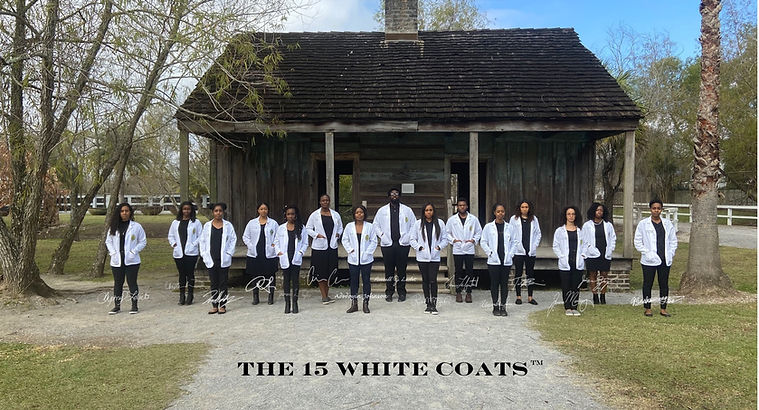

ABOUT
The 15 White Coats® is a Black physician-led group of change makers who are helping the next generation of minority physician aspirants by providing visual inspiration and economic support with hopes of diversifying healthcare for marginalized communities.Our organization is a federally recognized 501(c)(3) nonprofit based out of New Orleans, Louisiana and is named after a photo of 15 African American Tulane University School of Medicine medical students standing in front of a slave quarter at the Whitney plantation in Edgard Louisiana. The intention behind taking the photo was to illustrate to the entire world, how far African Americans have come historically with regard to healthcare, and our resilience to push past systemic barriers. The photo took off on social media, gained the moniker The 15 White Coats®, and had been featured by Good Morning America, NBC Nightly News with Lester Holt, New Orleans Times-Picayune, CNN, MSNBC, NPR, U.S. Today, AAMC, AMA, and People Magazine, and many other media appearances. Eventually, the students behindThe 15 White Coats® decided to take that 15 minutes of fame and turn it into a platform and an engine for change.

Russell J. Ledet, MD, PhD, MBA

Sydney C. Labat, MD

Rachel M. Turner, MD, MS, MA

Brian Washington
Today, the organization is led by Russell J. Ledet, M.D., Ph.D., MBA, Sydney Labat, M.D., Rachel Turner, M.D., and Brian Washington, Jr. Our nonprofit was started to do three things:
(1) to provide cultural imagery in the form of our iconic photos being placed in classrooms, learning spaces, and political buildings to illustrate how far African-Americans have come with regard to diversifying the medical profession,
(2) to utilize grassroots fundraising to economically assist historically marginalized individuals aspiring to enter into the medical field,
(3) to galvanize a keen interest in reading by placing books that are curated for cultural relevance in classrooms and learning spaces through Resilient Reader Book Club boxes.
OUR BOARD
To date, The 15 White Coats® have raised well over $200,000 and given out over $110,000 in scholarships. We have also placed our iconic photo in over 10,000 learning spaces around the globe. Importantly, it is a matter of personal conviction and commitment of its founding members that our nonprofit is a non-profit in its purest form. 100% of every dollar we raise goes towards our cause, and we are running this organization on a volunteer basis, aside from our overhead, since day one.
OUR TEAM
Lisa Batiste
Executive Director

Alyssa Banks
Social Media Manager

Carleah Joseph
Program Director - FTFP & HBCU Tethered Tour

Malaya White
Social Media Coordinator - HBCU Tethered Tour

Trinity Renee
Principal Systems Engineer

Dr. Vicki Robinson
Outreach Coordinator

In The News




.png)








